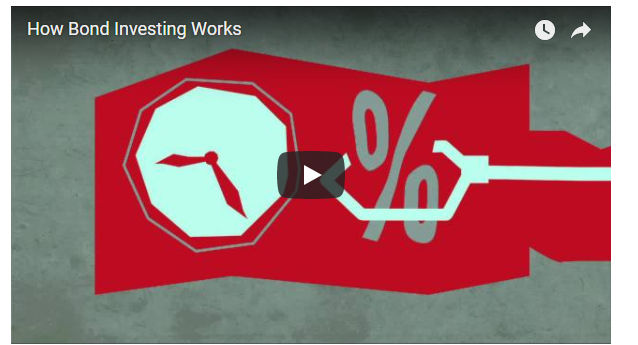When you decide to invest money, it’s important to commit to doing the appropriate research that will protect your financial investment. When you think of saving you generally think of a bank. And when you think of investing generally you think of either stocks or bonds. Stocks are a form of ownership while bonds are a form of debt. So if you buy a stock you participate in the good fortune of a company but you also can participate in its losses. Bonds on the other hand are you loaning money to a company. You don’t participate in any appreciation you are simply paid interest for using your money. You also don’t have the risk of the company value decreasing. Even if a company goes bankrupt bondholders are ahead of stockholders in getting their money back. For this reason bonds normally have a lower yield than stocks, but also a lower risk. There are several different types of bonds and bond funds. Typically the difference is based on the type of issuer but differences also come from how the bond is structured.
1—Municipal Bonds
Municipal bonds are issued by state and local governments. Individuals who have invested in municipal bonds over the years are quick to tout their advantages. Local and state governments sell these bonds to fund special projects that benefit their communities . The local taxing authority guarantees payments to investors. If the investor lives in the state that issues the bond, interest payments are exempt from federal taxes. Municipal bonds can reduce the overall volatility of your portfolio investments and can provide important tax savings for high-income earners. Generally, municipal bonds are considered fairly safe because local governments can simply raise taxes to pay for them but recently some municipalities like Detroit and Puerto Rico have had difficulty making bond payments and have considered default.
2—Treasury Bonds, Bills and Notes
A United States Treasury security is an IOU from the US Government. There are four types of treasury securities: Treasury bills, Treasury notes, Treasury bonds, and Treasury Inflation Protected Securities (TIPS). The primary difference between the first three is the length of time until maturity. TIPS on the other hand have a built in clause to adjust for inflation and could be a good investment during times when inflation is expected to pick up.
3—Corporate Bonds
A corporate bond is a bond issued by a company or corporation in order to raise financing for a variety of reasons such as to ongoing operations, M&A, or to expand business. The term is usually applied to longer-term debt instruments, with maturity of at least one year. The interest rate or “coupon” of a corporate bond is based on the perceived risk of the company and the overall interest rate market climate. If a company is considered “high risk” any bonds it issued might be considered “Junk Bonds” and although they offer higher returns there is always the chance of losing your entire investment.
One way to lower the risk of an individual bond defaulting is to purchase a “Bond Fund”. However, in a junk bond fund if the overall market collapses many of the components could default causing the entire fund to decline in price.
4 –Short-Term Bond Funds
Short term bond funds (as the name implies) invest in bonds that have a near term maturity. Therefore they carry less risk because there is less time for something bad to happen to the issuer. A bond fund offers a way to boost your return while still avoiding the risk of stocks and to diversify the risk of holding single bonds. Bond funds offer a way to make the most of the money invested. Short-term funds are considered the more beneficial way to make this financial play, because they limit the amount of price drop that would occur with each increase in interest rates, reducing the impact on yield. If you’re particularly interested in business, bonds, and finance there are additional resources to help you find more information here.
One of the newer more esoteric types of bonds is “pay for success” bonds.
5—Pay-For-Success Models
Another name for this type of bond is a social impact bond. It’s a new option for those who wish to invest privately. There are currently around $200 million dollars in PFS contracts worldwide. In this type of bond the financing comes from private investors. In a PFS contract, investors pay and a mediator sets the stage for the desired outcome, the actual outcome is determined by a neutral party, and if the desired outcome was met the investors are repaid. Because there is a risk that the outcome won’t be met it is a sort of hybrid between a bond and a stock.
Diversification is a key concept in investing for the future. Your age and financial goals will have a bearing on the types of investment vehicles you should have in your portfolio. Bonds offer a low-risk investment that can offer safe and reliable additions, and some can provide significant tax benefits. These 3 bonds will increase your holdings, while providing a measure of security for your money.
See Also:

